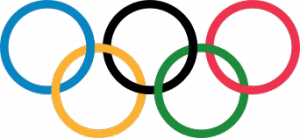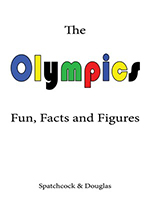You might think the Olympics are over, but the countdown to the Paralympics has only just begun. These games, for athletes with impaired physical abilities, start on 7th September in the same place as the Olympics – Rio De Janerio.
While we wait, here is some cool info on the Modern Olympics. You can read our post about the Ancient History of the Olympics to catch up.
The ancient Olympic games officially began in 776 BC in Greece and occurred every four years, or Olympiads, ending in 393 AD (after about 1000 years) because they were considered a pagan practice.
Pierre de Coubertin, a French educator, believed in the importance of physical education, and in international competition. Coubertin helped to revive the idea of the olympic games in the 1890s and was a founding member of the International Olympic Committee (IOC) in 1894.
The modern olympic games began with the 1896 Olympics in Athens, Greece.
 A couple of well known symbols that are used to promote the games are the olympic flag and the olympic flame. The rings on the Olympic flag represent the five parts of the world: the Americas, Europe, Asia, Africa and Australia.
A couple of well known symbols that are used to promote the games are the olympic flag and the olympic flame. The rings on the Olympic flag represent the five parts of the world: the Americas, Europe, Asia, Africa and Australia.
The number of sports that are played in the current olympics are much higher and more diverse than at the ancient olympic games; they include archery, athletics, badminton, basketball, boxing, canoeing, cycling, diving, equestrian, fencing, football, golf, gymnastics, handball, hockey, judo, modern pentathlon, rowing, rugby sevens, sailing, shooting, swimming, taekwondo, tennis, triathlon, volleyball, water polo, weightlifting, and wrestling.
And that’s just the summer olympics! The winter olympics are held every four years as well, the next one will be in 2018 in PyeongChang, Korea. The sports at the winter olympics are all done in snow or ice; skiing, bobsleigh, curling, skating, ice hockey, luge, ski jumping, and snowboarding.
Check out this Enyclopaedia Britannica article about the history of the Olympic games! (You’ll need your library card to login)
Want to know more? Find these books in your local library:
 The story of the Olympics : the wacky facts about the Olympics and Olympic champions down the centuries! by Richard Brassey
The story of the Olympics : the wacky facts about the Olympics and Olympic champions down the centuries! by Richard Brassey
“Records and reputations, cheats and champs, victors and venues – here’s the lowdown on the modern Olympic games, from bestselling author and illustrator, Richard Brassey. From the games of ancient Greece to the twenty-first century, and with individual tales of heroes and heroines, this is a lively, witty and entertaining guide for young readers everywhere. As always with Richard Brassey’s popular books, this is packed with comic strips, fact boxes, hilarious captions and speech bubbles, plus amazing information and entertaining insight.” (Syndetics summary)
 The Olympics : ancient and modern by Joe Fullman
The Olympics : ancient and modern by Joe Fullman
“The Olympics Ancient to Modern is a fascinating look at the history of the Olympic and Paralympic Games, from the first events in Ancient Greece right the way up to London 2012 and Sochi 2014. It focusses on when and where each Games has been held, and some key stats, such as how much it cost, how many athletes competed, and how many spectators came to watch.” (adapted from Syndetics summary)
 Modern Olympic Games by Haydn Middleton
Modern Olympic Games by Haydn Middleton
“‘The Olympics’ tells you all about the world’s greatest sporting festival. From ancient Greece to the 21st century, you will read about the winners, losers, triumphs, and tragedies of the Olympic Games.” (Syndetics summary)
 The Olympics by Graham Douglas (eBook)
The Olympics by Graham Douglas (eBook)
“The Olympic Games: a major international amateur sporting competition that brings together hundreds of nations and thousands of athletes. This book is a collection of fun, facts and figures about the Games (from ancient to modern times) for sports lovers all over the world. ‘The most important thing in the Olympic Games is not winning but taking part; the essential thing in life is not conquering but fighting well’ Pierre de Coubertin.” (Syndetics summary)